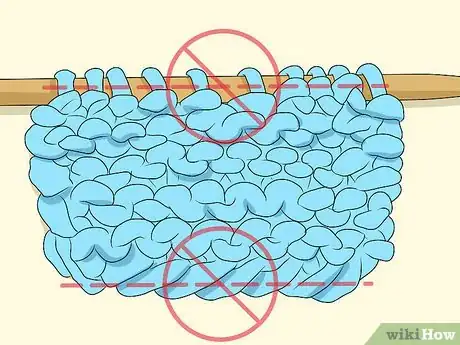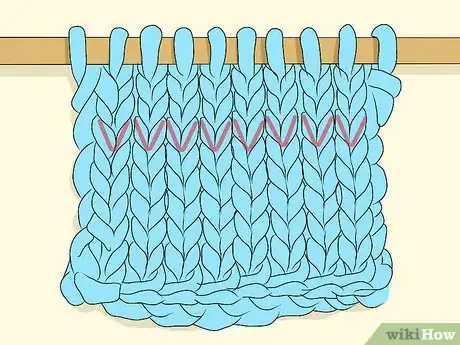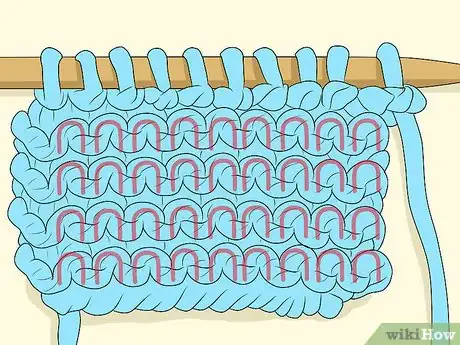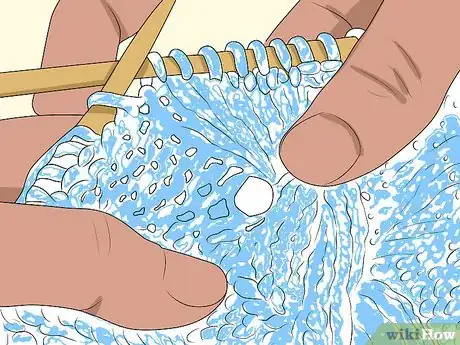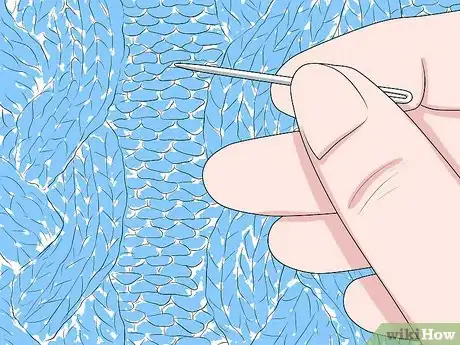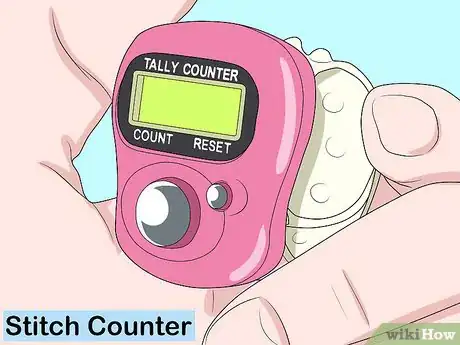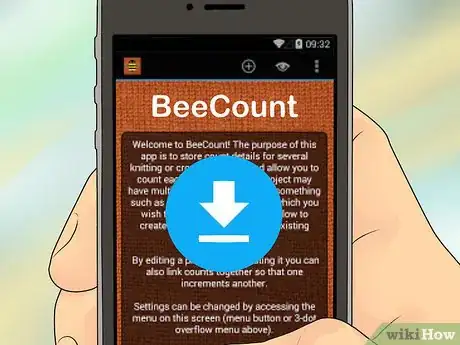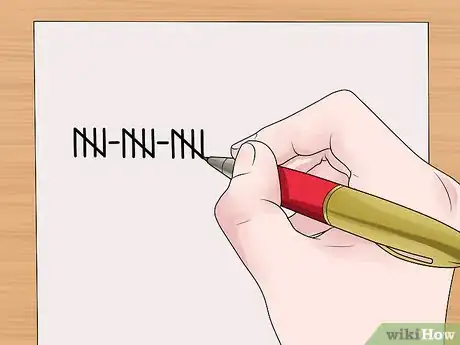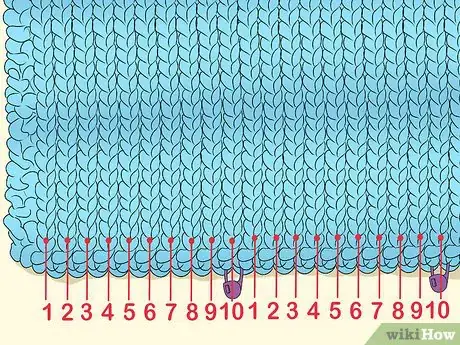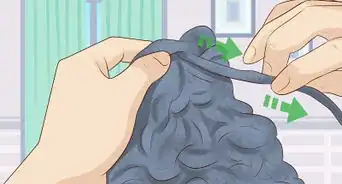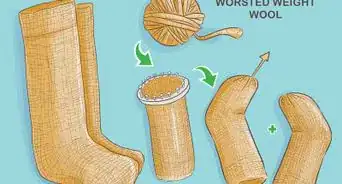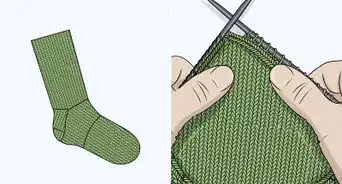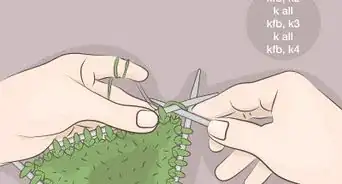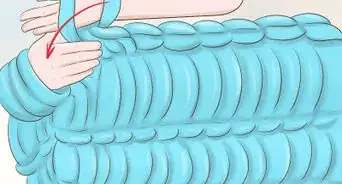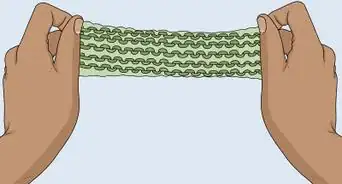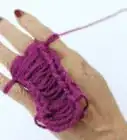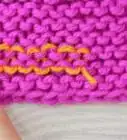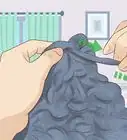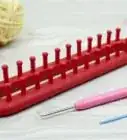This article was co-authored by Jen Webber. Jen Webber is a Knitting Specialist and the Manager of The Quarter Stitch, a crafting store based in the French Quarter of New Orleans, Louisiana. With over 17 years of knitting and crafting experience, Jen helps educate customers and the public on best knitting practices for their DIY projects.
This article has been viewed 107,491 times.
Counting your rows in knitting can be daunting and confusing, especially if you have a lot of rows to count or you find it difficult to identify your stitches. However, it is often necessary to count rows to ensure that you complete a project correctly. By learning some simple strategies for identifying your stitches and using tools meant to make row counting easier, you will find that counting rows is much easier.
Steps
Identifying the Stitches in Rows
-
1Ignore the stitches in your cast on row and on your needles. The cast on row at the bottom of your knitting and the stitches on your knitting needle do not count. Ignore these stitches when you are counting your rows. Begin counting on the row above the cast on row and finish counting on the row before you get to your knitting needle.
-
2Look for the V’s in your work. To identify a knit stitch, look for V shapes. Each V is a stitch in a row, so you can easily count rows by counting the V’s from the bottom to the top of your knitting.
- For example, if you count 5 V’s going from the bottom to the top of your knitting, then your knit piece has 5 rows in it.
Advertisement -
3Count the upside down U shapes. If you are working in garter stitch or if you want to count the purl stitches instead of the knit stitches, then you can also count the upside down U shapes, or “frowns,” in your knitting. Each of these shapes represents a stitch in a row, so you can count these going from the bottom to the top of your knitting to find out how many rows you have knitted so far.
- For example, if you count 10 U shapes or frowns going from the bottom to the top of your knit piece, then you have 10 rows.
-
4Look for the hole in between your cables. Counting the stitches from the top to the bottom of a cable stitch can be confusing because of the odd angles of the stitches. The easiest way to count the stitches in cables is to locate the hole in between your cables and then count the ladders above the hole. Insert your finger through the hole where your cables cross. Then, count the ladders above the hole using your fingers to spread the cables apart as needed. Your total number of stitches for each cable will be equal to the number of ladders minus 1.[1]
- For example, if you count 7 ladders above the hole, then you have 6 stitches.
-
5Use the tip of a knitting needle or yarn needle to help you count. If you find it hard to identify the stitches in your knitting just by looking at them, or if you find it hard to keep track of them, then you might find it helpful to use the tip of a knitting needle or yarn needle as a guide. Point to each stitch with the tip of the needle going from the bottom to the top of your knit piece. Count each stitch as you point to it.[2]
Using Tools to Count Rows
-
1Get a stitch counter. Stitch counters are helpful tools for counting your stitches as you work. You can place a stitch counter on the end of one of your needles, place it next to you while you work, or even wear it like a necklace. After you complete each row, click the button on your stitch marker or turn the counter.[3]
- Try to find a stitch marker that you can easily use with one hand. Otherwise, you will have to put down your knitting each time you finish a row and that will slow you down.
- Some stitch markers also have helpful features, such as locking numbers, to prevent the stitch marker from increasing the count if you accidentally press the button after you finish knitting for the day.
-
2Download a knitting app. There are lots of free knitting apps that you can download to help make it easy to count your stitches. You can simply tap the screen on your smartphone or tablet each time you complete a row. Look for a stitch counter app or a knitting app that has a stitch counter feature.[4]
- Some good knitting row counter apps include the BeeCount Knitting Counter, Knitting and Crochet Buddy, and the Knitting Row Counter.
-
3Keep a tally with pen and paper. If you don’t want to use a counter or an app, then you can always go low-tech and keep a tally of your rows with a piece of paper and a pen or pencil. Make a mark on the paper after you complete each row to keep track of your knitting rows.[5]
- For example, if you have 15 marks on a sheet of paper, then you would know that you have knit 15 rows.
-
4Place stitch markers every 10 rows or so. A good option for working on larger projects is to place a stitch marker after every tenth row. This will allow you to count your rows in 10’s rather than stopping after every row to click a counter, tap an app, or make a tally mark. You can simply count your rows in groups of 10 and place markers at the end of every tenth row.[6]
- For example, if you have 7 markers on the edge of your knitting, then you have 70 rows plus however many rows you have worked beyond the last marker
Expert Q&A
Did you know you can get expert answers for this article?
Unlock expert answers by supporting wikiHow
-
QuestionHow do you easily count knitting rows?
 Jen WebberJen Webber is a Knitting Specialist and the Manager of The Quarter Stitch, a crafting store based in the French Quarter of New Orleans, Louisiana. With over 17 years of knitting and crafting experience, Jen helps educate customers and the public on best knitting practices for their DIY projects.
Jen WebberJen Webber is a Knitting Specialist and the Manager of The Quarter Stitch, a crafting store based in the French Quarter of New Orleans, Louisiana. With over 17 years of knitting and crafting experience, Jen helps educate customers and the public on best knitting practices for their DIY projects.
Knitting Specialist
-
QuestionIf row 1 is knit and row 2 is purl, and the pattern says to repeat rows 1 and 2, 32 times, does that mean a total of 64?
 Kat NordstromCommunity AnswerYes it does. You are going to be doing 1 and then 2, 32 times. If it helps, think of 1 and 2 as one block, and you have to do 32 blocks.
Kat NordstromCommunity AnswerYes it does. You are going to be doing 1 and then 2, 32 times. If it helps, think of 1 and 2 as one block, and you have to do 32 blocks. -
QuestionHow do I find the right width and length of stitches when sewing?
 Community AnswerMost machines are equipped with stitch adjusters. Read the manual. It shows where they are located.
Community AnswerMost machines are equipped with stitch adjusters. Read the manual. It shows where they are located.
References
- ↑ https://fringeassociation.com/2016/09/07/hot-tip-count-your-cable-crosses-correctly/
- ↑ https://www.craftsy.com/blog/2016/10/knitting-row-counter/
- ↑ https://www.craftsy.com/blog/2016/10/knitting-row-counter/
- ↑ https://www.craftsy.com/blog/2016/10/knitting-row-counter/
- ↑ https://www.craftsy.com/blog/2016/10/knitting-row-counter/
- ↑ https://www.craftsy.com/blog/2016/10/knitting-row-counter/
About This Article
To count knitting rows, always begin your count on the row above the cast and finish counting before you get to your knitting needle. To identify and count a knit stitch, look for V shapes, which is a stitch in a row, so you can easily count rows by counting the V’s. For garter stitches, count the upside down U shapes. No matter how you’re counting your stitches, you can always use the tip of your knitting needle to help you count. For more tips, including how to use a stitch counter and stitch markers, read on!
